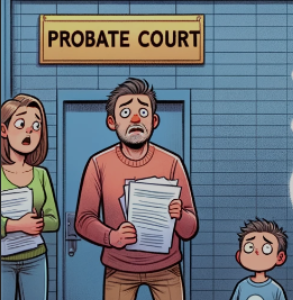Picture this: You’ve spent a lifetime building your legacy and now want to ensure your assets pass on to your loved ones with minimal fuss. But now you’re wondering, “Are wills public record?” In North Carolina, like many places, your will, once a private declaration of your final wishes, can become as accessible as a library book, available for anyone’s curious eyes.
Why does this matter, and more importantly, how can you keep these deeply personal matters private?
The will is the heart of estate planning, a powerful tool that speaks for you when you can no longer. But here’s the twist: the very act of ensuring your legacy can inadvertently expose your private wishes to the public. And that’s not all. The public nature of the probate process can also cause problems for your loved ones.
While your last will and testament can end up in the public domain, there are ways to keep your estate plan under wraps. Understanding these nuances can make all the difference in protecting your loved ones.
Let’s explore why and how to safeguard your legacy with the privacy it deserves.
Are Wills Public Records in North Carolina?
Imagine penning the final chapter of your life’s story with a will that outlines the distribution of your treasured memories and assets. Now picture this document in a file, accessible to anyone curious enough to search through North Carolina’s probate court records. Surprising, isn’t it?

Wills become public records once filed with the court after you pass away. Let’s dive into why this happens and how we can manage it, making informed estate planning less daunting.
Why Wills End Up in the Public Eye
A will’s journey to the public domain starts at the probate court, the place where your loved ones settle your estate. After you leave this world, your will heads to the probate court in the county where you lived.
Here, the formal procedure to authenticate your will, settle debts, and distribute assets begins. Since the court records probate processes, they naturally become public records. Thus, anyone can walk into the courthouse or sometimes even go online to access your estate’s details.
Your neighbor, an estranged family member, or just a nosy person can find out who got your property, where your assets are, and other private details. Creditors can also swoop in, making false claims on your estate and take money out of your family members’ hands.

Navigating the Probate Process
In North Carolina, most wills go through the probate process. This means a loved one usually files them with the clerk of superior court.
In the court, a personal representative or executor manages the estate under court supervision. They gather your assets, pay off debts and taxes, and distribute the remainder to your heirs. Documents related to your estate, including the will, become part of the accessible public records.

Not everything you own goes through this process, though. Specific assets, like those in a trust or with designated beneficiaries, skip probate courts.
These assets go straight to the beneficiaries, without the court getting involved.

Why Your Will Becoming Part of Probate Records Matters
Knowing your will can become a public record might change how you view estate planning.
It’s not just about who gets your vintage records or the beach house. It’s also about how the law treats your wishes after you’re gone. For many, keeping personal matters private is crucial.
Consulting an estate planning attorney can help you understand what’s at stake, ensuring your wishes are honored while maintaining your family’s privacy.
Reasons to Keep Your Will Private
When you draft your will, you’re laying out the roadmap for your legacy after you’re gone. It’s a deeply personal document, reflecting your wishes, relationships, and life’s accumulated treasures.
But once it enters the probate process in North Carolina, this private document becomes public, accessible by just about anyone who’s interested. Let’s break down why keeping your will private is so crucial.
Privacy Protects Your Family’s Peace
The idea of someone sifting through the details of your estate might not sit well with you. And for good reason.
Your will contains sensitive information — who inherits what, the value of your assets, and potentially, your family’s dynamics.
Keeping this document out of public records shields your loved ones from nosy onlookers, protects against potential fraud, and helps avoid the airing of private family matters.
Avoiding Potential Conflict
When your will becomes a matter of public record, you’re essentially giving everyone access to what you left behind and to whom.
This transparency can sometimes fuel disputes among family members or even invite claims from those you never intended to include.

By keeping your will private, you minimize the risk of disputes, ensuring that your wishes are followed as smoothly and conflict-free as possible.
Safeguarding Sensitive Information
Your will might detail not just who gets what, but also where your assets are located. Making such information publicly accessible can raise security concerns.
It can make your beneficiaries targets for scams or undue pressure. By maintaining the privacy of your estate plan, you protect the security and well-being of your beneficiaries.
So, how can you ensure your will stays private, and your wishes are honored without the whole world knowing? It’s all about planning smarter and understanding the legal tools at your disposal to avoid the probate process.
Working with an estate planning attorney can help you navigate these choices, from setting up trusts to designating beneficiaries in ways that bypass the need for probate.

Remember, your legacy is not just about what you leave behind but also how you protect those you care for in the process.
How to Avoid Your Will Becoming Public Record
Now, onto a topic close to the hearts of many: keeping your estate plans private. In North Carolina, it’s all about smart planning, and yes, it’s possible to keep your will out of the public eye. Let’s dive into the why and how.
Understanding Trusts: Your Privacy Shield
Trusts are your go-to for keeping your estate plans under wraps. They allow you to transfer your assets without the probate court getting involved.
Why does this matter? Once a will hits probate, it becomes a public record. Trusts, on the other hand, skip this step entirely. Your assets go directly to your beneficiaries without the court, which means generally no public access to your estate details.

Revocable Trusts: Control Now, Privacy Later
A revocable trust, also called a living trust, gives you control over your assets while you’re alive and breathing. You can change or cancel it at any time.
When you pass away, it becomes irrevocable, locking in your wishes and keeping your estate private. It’s a powerful tool to manage your estate on your terms and keep the details out of the public domain.
Choosing the Right Trust
North Carolina’s trust laws are pretty flexible, allowing various trusts for different purposes. Whether it’s setting aside funds for a loved one’s education or ensuring a beloved pet is cared for, there’s a trust for that.
The key is tailoring your trust to fit your needs while ensuring your privacy and the swift transfer of your assets to your beneficiaries.
Working With Professionals
Diving into the world of trusts and estate planning can feel overwhelming. But you don’t have to go it alone.
Estate planning attorneys are your navigators, helping you choose the best path to protect your assets and keep your plans private. They understand the ins and outs of North Carolina’s laws and can tailor a plan that meets your needs and keeps your estate out of the public eye.
Final Thoughts
Your legacy is yours to control. By understanding the tools available, like trusts, and working with the right professionals, you can ensure your wishes are honored without becoming a matter of public record.
It’s not just about protecting your assets; it’s about protecting your privacy and the privacy of your loved ones. With the right planning, you can keep your estate matters exactly where they belong: within the family.
For more detailed guidance on creating trusts in North Carolina and ensuring your estate remains private, consult an experienced estate planning attorney.
We Can Help
At Hopler, Wilms, and Hanna, we understand that estate planning can feel like venturing into uncharted waters. It’s personal, it’s complex, and yes, it can even be a bit daunting. That’s exactly why we’re here: to guide you through every step, making the process not just manageable, but empowering.
We don’t just draft documents; we craft personalized strategies that reflect your life, your wishes, and your legacy.
From deciding about wills and trusts to navigating North Carolina’s probate laws, we’ve got you covered. Our team brings experience, empathy, and a deep commitment to ensuring your estate plan does exactly what you need it to do—protect your assets and your loved ones.
Think of us as your estate planning partners. We’re here to listen, advise, and tailor a plan that fits your unique circumstances and goals. Whether you’re looking to keep your estate affairs private, provide for your family, or ensure a smooth transition of your assets, we have the tools and knowledge to make it happen.
And our relationship doesn’t end with a signed document. Life changes, and so will your estate plan. We’re here for the long haul, ready to adjust your plan as your life evolves. Births, marriages, new homes, or changes in the law—we’ll make sure your estate plan stays up-to-date and effective.
At Hopler, Wilms, and Hanna, your peace of mind is our priority. Let us take the worry out of estate planning, so you can focus on what matters most: enjoying life and leaving a lasting legacy.
Ready to get started? Reach out today. Let’s chart your course together.

